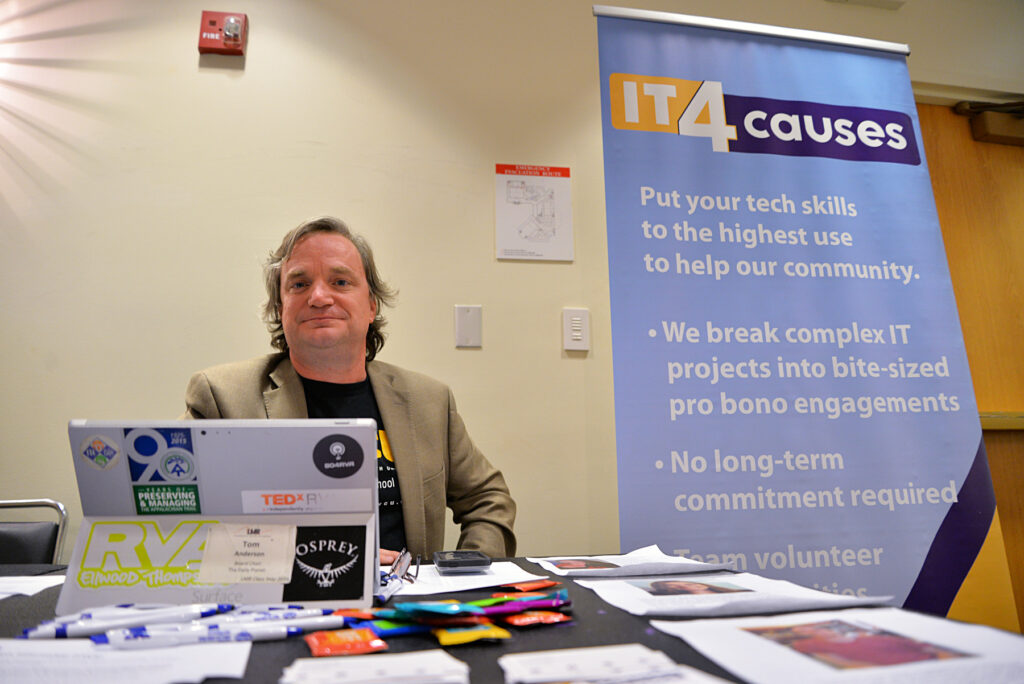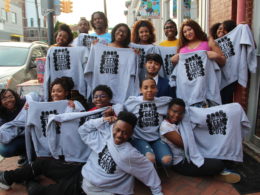For much of Tom Anderson’s career, there was always this tension between heart and head. Growing up in a family of modest means, the founder of IT4Causes studied electrical engineering in college, confident that it would lead to well-paying jobs and the satisfaction that comes with it.
Somewhere along the way, however, Anderson realized that the best part of his days was less about the money making, less about his work on behalf of clients and more about serving the community outside of work.
A Winding Path
First at Honeywell, he jumped headlong into the company’s volunteer program, helping lead an employee group that collected money and materials from fellow employees and distributing the resources via 40 different agencies in need. And years later, that sense of satisfaction in serving others reemerged at Capital One— where he was able to do rewarding work while holding down his primary job in IT.
So, when he made plans to leave CapOne, Anderson figured it was time to merge his passion with his profession. What was it that Mark Twain said? “Find a job you love, and you’ll never work a day in your life.”
“It became obvious to me that I should try to find a way to pull this thing that I had passion about on the side of my desk and try to make it my main gig,” Anderson said. “Part of my strategic planning for myself was wanting to get out of just making people richer and focus more on the community.”
He pursued Leadership Metro Richmond and graduate studies in nonprofit management at VCU, where a class at the Wilder School forced him to put his ideas to paper. Through this training, Anderson had not only expanded his knowledge of nonprofit operations, but he also developed a network of nonprofit leaders that would be essential in helping him shape the structure of a new company.

The Start of IT4Causes
And so IT4Causes was born, a company dedicated to helping nonprofits with their technology needs at a substantially lower rate than what these agencies might find in the marketplace.
But first, a bump in the road. Not long into his new enterprise, he realized that his original vision for the company was not tenable. He had envisioned a model wherein donors and corporate sponsors would basically underwrite the services, which, in turn, would be free to nonprofit clients. Donations, however, were hard to come by, with most donors wanting to give directly to organizations and not make investments in their infrastructure. And all too often, nonprofits didn’t have enough skin in the game to follow up on their side of the technology work.
Enter plan B, which is how IT4Causes operates today – a fee-for-service model that relies on the company’s small but capable staff but also on a cadre of volunteers – around 400 of them these days – as well as some crackerjack interns who know their way around laptops, networks and the like.
The company thinks in terms of capacity. It can allot 120 hours of staff time per week, and on top of that, there’s between 100 and 140 hours of hours available for both volunteers and interns. It’s what Anderson calls a “one-third/one-third/one third model.”
“We try to give each client between two to five hours of service for every hour they pay for,” he says.

Immediate Impact
It’s a model that his nonprofit clients can’t get enough of. One of IT4Causes earliest clients was Leadership Metro Richmond.
“We were happy to be the guinea pig,” recalls Vikki Keszey, LMR’s director of operations. “IT has always been a pain point for us financially, as I’m sure it is for a lot of nonprofits.”
So, LMR pulled the trigger and retained IT4Causes, and it started with a full analysis of its technology, looking at its server, computers, internet, inventory control system, phones – the works.
“What they did was basically help us modernize our systems across the board – moved us to the Cloud, into 365, into a voice-over IP system for our phones. That was huge as we made that transition right before the pandemic, and so staff was able to take calls from their homes.”
One of the other major contributions has been the company’s work in helping LMR shore up its IT security, which includes regular training on how to identify phishing schemes.
“They’ve done all this for so much less than we would have paid for these kinds of services with other IT companies,” says Veszey. “Over the past 10 years, I can’t even begin to guess how much we’ve saved because of its amazing business model. I can’t gush enough about it.”
Nonprofits can learn more about IT4Causes’ services here.










